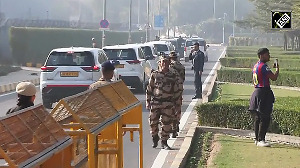The suicide attack on a Muharram procession in Karachi on Monday, in which 40 people were killed and over 95 sustained injuries, has added to the Pakistan government's woes, as the attack may spell more trouble by igniting massive sectarian clashes.
Analysts believe the attack was a deliberate attempt by the extremists to further destabilise the country and create a divide among the masses.
"The Taliban and jihadi elements are very much opposed to Shiites, and this suits their double purpose of destabilising the state while creating despondency amongst the people, and especially the Shiites," The New York Times quoted Talat Masood, a retired Pakistani general and military analyst, as saying.
Masood pointed out that the attack could be the handiwork of a militant Sunni group with a history of sectarian attacks.
He was referring to the banned Lashkar-e-Jhangvi, a militant group with links to Al Qaeda and the Taliban.
Even Pakistani President Asif Ali Zardari, in his message after the blast, warned that "a deliberate attempt seems to be afoot by the extremists to turn the fight against militants into a sectarian clash and make the people fight against one another".
Police officials have blamed Sunni extremists, probably having links with the Taliban, for the attack on the religious procession.
Karachi, the country's financial capital, was until now unaffected by the terror spree prevalent in the country, but Monday's suicide blast saw angry protestors burning down dozens of shops and cars.
Riots also broke out in Hyderabad, the second-largest city in the Sindh province.
Karachi's suicide attack came hours after a suicide bomber in Muzaffarabad, the capital of Pakistan occupied Kashmir killed at least 10 people and wounded more than 80 during a Shiite procession.
The bomber had tried to enter a prayer hall, but blew himself up when he was intercepted by security guards.
The bombings have mocked the security arrangements made for the annual procession, and have once again highlighted the nefarious aims of the extremists who want to serve their purpose by creating a rift among the country's citizens.




